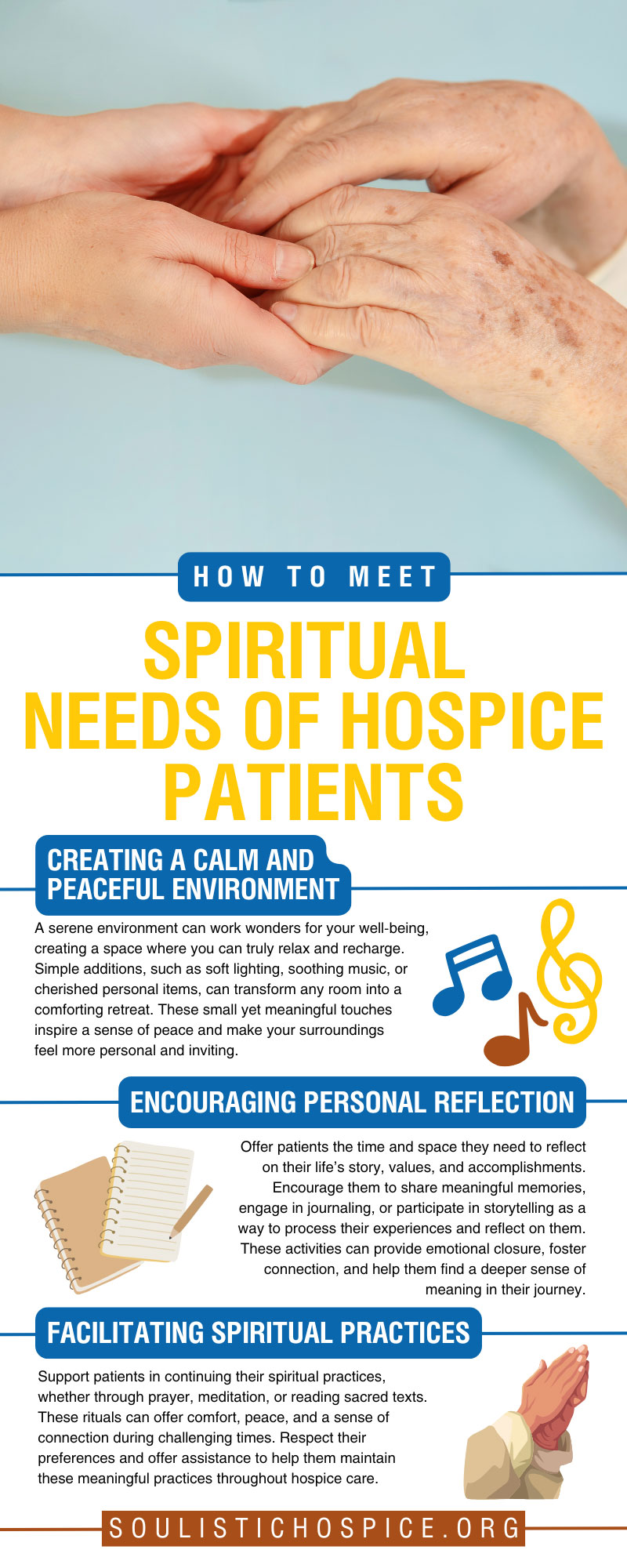
Providing hospice care includes more than just addressing physical health or managing symptoms. A holistic approach also considers emotional, psychological, and spiritual dimensions. For many hospice patients, spiritual needs take center stage, acting as a source of comfort, meaning, and peace in life’s final chapter. Whether you’re a caregiver, family member, or friend, understanding how to meet the spiritual needs of hospice patients is hugely beneficial.
Understanding Spiritual Needs
Helping patients connect with their inner selves, values, and beliefs is central to meeting spiritual needs. These may manifest differently for each individual, shaped by personal faith, past experiences, or even non-religious practices. Here's how spiritual needs commonly show up for hospice patients:
Seeking Meaning or Purpose
Hospice patients often reflect deeply on their lives, searching for meaning in their experiences, achievements, and relationships. During this time, they may also seek reassurance and validation for the choices they’ve made, finding comfort in understanding the impact of their journey.
Fostering Connections
Building stronger relationships with loved ones, friends, or even a higher power can provide patients with a sense of stability and connection, ultimately enhancing their overall well-being. These meaningful bonds help them feel anchored and supported during challenging times.
Finding Inner Peace
Spiritual needs often revolve around reconciling fears, regrets, or unresolved conflicts, which can weigh heavily on a person's mind and soul. For many, addressing these issues becomes a vital process that provides clarity, comfort, and peace as they approach the end of life.
Acknowledging these unique aspects of spirituality creates a foundation for providing meaningful care and support.
The Role of Hospice, Caregivers, and Family
Meeting spiritual needs requires a collaborative approach among caregivers, hospice teams, and family members. While each group plays a distinct role, their shared focus on providing comfort and respect creates a cohesive circle of support.
Caregivers and family members are often the patient’s constant companions, giving them a unique opportunity to offer personal connection and understanding. Meanwhile, hospice providers like Soulistic Hospice bring professional expertise, offering spiritual guidance tailored to the patient’s values and preferences. Here are practical ways to create an atmosphere that nurtures spiritual well-being.
Creating a Calm and Peaceful Environment
A serene environment can work wonders for your well-being, creating a space where you can truly relax and recharge. Simple additions, such as soft lighting, soothing music, or cherished personal items, can transform any room into a comforting retreat. These small yet meaningful touches inspire a sense of peace and make your surroundings feel more personal and inviting.
Encouraging Personal Reflection
Offer patients the time and space they need to reflect on their life’s story, values, and accomplishments. Encourage them to share meaningful memories, engage in journaling, or participate in storytelling as a way to process their experiences and reflect on them. These activities can provide emotional closure, foster connection, and help them find a deeper sense of meaning in their journey.
Facilitating Spiritual Practices
Support patients in continuing their spiritual practices, whether through prayer, meditation, or reading sacred texts. These rituals can offer comfort, peace, and a sense of connection during challenging times. Respect their preferences and offer assistance to help them maintain these meaningful practices throughout hospice care.
Offering Access to Religious or Spiritual Leaders
Patients may find comfort and peace by connecting with spiritual advisors, such as a chaplain, priest, rabbi, or imam. These advisors can provide guidance, support, and reassurance during challenging times, helping patients navigate their emotional and spiritual needs. Ensure they have access to these figures, whether in person or virtually, to foster a sense of hope and connection.
Listening Without Judgment
Being present and truly listening is one of the most powerful ways to provide meaningful support to others. Provide patients with the opportunity to share their fears, beliefs, or concerns openly, without fear of judgment or dismissal. By creating a safe and welcoming space for honest expression, you help build trust and foster a sense of understanding and connection.
Sharing Uplifting Readings or Quotes
Offer to read passages, poetry, or inspirational quotes that are thoughtfully selected to match the patient’s preferences and interests. Taking the time to share meaningful words can bring comfort, encouragement, and a sense of connection during challenging moments. These moments provide hope and affirm the patient’s values and remind them they are cared for.
Encouraging Connection with Nature
If possible, try to incorporate elements of nature into their space to create a calming and uplifting environment. Fresh flowers, the soothing sound of birdsong, or even a clear view of the outdoors can make a significant difference. These natural touches can help patients feel more grounded, reduce stress, and foster a sense of connection to something larger than themselves.
Fostering Moments of Gratitude
Gently remind patients of the positive memories and relationships they’ve cherished throughout their lives, encouraging them to think back on the meaningful connections and experiences that have shaped them. Reflecting on these moments can evoke a deep sense of joy, peace, and fulfillment, helping them find comfort and gratitude in the present.
Providing Companionship in Silence
There’s a profound beauty in shared silence, where words are not needed to convey presence and care. Simply sitting with a patient in quiet companionship can provide deep comfort and remind them that they are not alone in their journey.
Respecting and Supporting Their Beliefs
Support the patient’s beliefs, even if they are different from your own, as respecting their perspectives fosters trust and understanding. Take proactive steps to help them access resources or perform rituals that provide a sense of peace, comfort, and reassurance.
How Soulistic Hospice Provides Spiritual Support
At Soulistic Hospice, we recognize that addressing spiritual needs is just as vital as providing physical or emotional care. Our interfaith ministers and spiritual care coordinators are dedicated to providing personalized, compassionate guidance to patients and their families.
Here are key ways we foster spiritual well-being:
Interfaith and Personalized Care
Our spiritual team respects and honors each patient’s beliefs, working within their faith or practices to deliver support that feels meaningful and authentic.
Compassionate Counseling
Through one-on-one conversations, we help patients find peace, strength, and direction during challenging times. Whether patients want to discuss existential concerns or seek emotional closure, our counselors offer unwavering support.
Family and Caregiver Guidance
Caring for a loved one in hospice can be overwhelming. Soulistic Hospice is here to walk families and caregivers through the emotional and spiritual challenges of end-of-life care. This partnership ensures families feel empowered and supported every step of the way.
Bereavement Services
Our commitment to spiritual care extends beyond the patient’s life. We provide grief and bereavement support to families, creating a foundation for healing and resilience.
When joining Soulistic Hospice, you’re not just accessing hospice care; you’re gaining a compassionate partner invested in the well-being of your loved one and your family.
Discover the Transformative Power of Spiritual Care
Spiritual support is a powerful, often overlooked form of care that helps hospice patients find peace, connection, and meaning in their final days. For caregivers, family members, and professionals, understanding how to support hospice patients spiritually brings immeasurable comfort.
At Soulistic Hospice, we’re proud to embody these values and help families and their loved ones through life’s most profound moments. If you’d like to learn more about our specialized hospice spiritual care, please contact our team today. Together, we can ensure every patient feels supported, valued, and loved.









